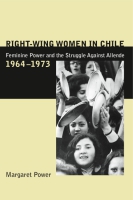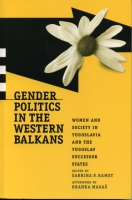
Women of the Right
Comparisons and Interplay Across Borders
Edited by Kathleen M. Blee and Sandra McGee Deutsch
Women of the Right
Comparisons and Interplay Across Borders
Edited by Kathleen M. Blee and Sandra McGee Deutsch
“The wave of populism sweeping through Western democracies is putting women forward—Sarah Palin in the United States, Marine le Pen in France, Siv Jensen in Norway. Yet one knows very little about these women of the right, who are overlooked by existing research. This book is one of the first to make a thorough empirical examination of how and why they get involved. Through a feminist and multidisciplinary perspective covering a century of mobilizations in four continents, it reveals the complex interaction between gender and politics. Even in movements that see them only as mothers and wives, women don’t act or think as men do, and they find in their activism some form of emancipation and transgression, blurring the left-right divide. A whole new planet is opening for research on this unexplored dark side of female activism.”
- Description
- Reviews
- Bio
- Table of Contents
- Sample Chapters
- Subjects
Aside from the editors, the contributors are Nancy Aguirre, Karla J. Cunningham, Kirsten Delegard, Kathleen M. Fallon, Kate Hallgren, Randolph Hollingsworth, Jill Irvine, Vandana Joshi, Carol S. Lilly, Annette Linden, Julie Moreau, Margaret Power, Mariela Rubinzal, Daniella Sarnoff, Ronnee Schreiber, Meera Sehgal, Louise Vincent, and Veronica A. Wilson.
“The wave of populism sweeping through Western democracies is putting women forward—Sarah Palin in the United States, Marine le Pen in France, Siv Jensen in Norway. Yet one knows very little about these women of the right, who are overlooked by existing research. This book is one of the first to make a thorough empirical examination of how and why they get involved. Through a feminist and multidisciplinary perspective covering a century of mobilizations in four continents, it reveals the complex interaction between gender and politics. Even in movements that see them only as mothers and wives, women don’t act or think as men do, and they find in their activism some form of emancipation and transgression, blurring the left-right divide. A whole new planet is opening for research on this unexplored dark side of female activism.”
“Pathbreaking research and sparkling analysis in an accessible and coherent collection that brilliantly illuminates a neglected area of social science research on right-wing movements.”
“Kathleen Blee and Sandra McGee Deutsch have produced an important book that examines the role of women in extreme right movements around the globe. Their collection of scholarly essays refuses easy explanations, showing instead that rightist women have both defended and challenged traditional stereotypes of family and society, just as they have sometimes blurred the line between left and right. The bottom line, as Blee and Deutsch rightly point out, is that women, like others, are complex human beings who make different choices in various cultural and political contexts.”
“Women of the Right is a very valuable contribution to a growing field. It is cutting-edge, occupying a cross section between the burgeoning field of gender and transnationalism and the study of women in right-wing movements. It is particularly exciting because it not only offers various national case studies and brings us up to the present day but also draws important comparisons and contrasts between the ideas, representations, and organization of women on the right and the far right.”
“Kathleen Blee and Sandra McGee Deutsch, distinguished pioneers in the field of right-wing women’s history, have done it again. This book is impressive in its scope and depth, taking the field to a new level. Blee and Deutsch have assembled a fine collection that builds and expands on previous research on gender and right-wing politics. They address the topic in a transnational context while paying close attention to local actors and circumstances.”
“A major contribution not only to work on women and different strands of the right but also to our understanding of the right transnationally.”
“Kathleen Blee and Sandra McGee Deutsch have assembled a first-rate group of scholars. The result is a splendid volume that throws new light on the role of women in far-right movements and parties.”
“The chapters are all highly informative, well reasoned, and excellently written. This major advance will be of lasting value to scholars of gender studies, contentious politics, and global development.”
“[A] highlight of Women of the Right is the editorial practice of pointing out similarities between the diverse essays that make up the volume, reinforcing the book’s thesis that rightist women’s activism was propelled by trans- and international connections.”
“[Women of the Right makes] compelling reading on a still-fresh topic in women’s history.”
Kathleen M. Blee is Distinguished Professor of Sociology at the University of Pittsburgh.
Sandra McGee Deutsch is Professor of History at the University of Texas at El Paso.
Contents
Acknowledgments
List of Abbreviations
Introduction
Kathleen M. Blee and Sandra McGee Deutsch
PART 1 TRANSNATIONAL AND COMPARATIVE STUDIES
1 Transnational Connections Among Right-Wing Women: Brazil, Chile, and the United States
Margaret Power
2 Exporting the Culture Wars: Concerned Women for America in the Global Arena
Jill A. Irvine
3 Memoirs of an Avatar: A Feminist Exploration of Right-Wing Worlds in SecondLife.com
Randolph Hollingsworth
4 Righting Africa? Contextualizing Notions of Women’s Right-Wing Activism in Sub-Saharan Africa
Kathleen M. Fallon and Julie Moreau
5 Gender, Islam, and Conservative Politics
Karla J. Cunningham
6 Women in Extreme Right Parties and Movements: A Comparison of the Netherlands and the United States
Kathleen M. Blee and Annette Linden
PART 2 PRIVATIZING THE PUBLIC, POLITICIZING THE PRIVATE
7 Maternalism Goes to War: Class, Nativism, and Mothers’ Fight for Conscription in America’s First World War
Kate Hallgren
8 From Suffrage to Silence: The South African Afrikaner Nationalist Women’s Parties, 1915–1931
Louise Vincent
9 Porfirista Femininity in Exile: Women’s Contributions to San Antonio’s La Prensa, 1913–1929
Nancy Aguirre
10 Domesticating Fascism: Family and Gender in French Fascist Leagues
Daniella Sarnoff
11 The Volksgemeinschaft and Its Female Denouncers in the Third Reich
Vandana Joshi
12 Mothering the Nation: Maternalist Frames in the Hindu Nationalist Movement in India
Meera Sehgal
PART 3 COUNTERING THE LEFT
13 “It Takes Women to Fight Women”: Woman Suffrage and the Genesis of Female Conservatism in the United States
Kirsten Delegard
14 Women’s Work in Argentina’s Nationalist Lexicon, 1930–1943
Mariela Rubinzal
15 “To Tell All My People”: Race, Representation, and John Birch Society Activist Julia Brown
Veronica A. Wilson
16 Leading the Nation: Extreme Right Women Leaders Among the Serbs
Carol S. Lilly and Jill A. Irvine
17 Dilemmas of Representation: Conservative and Feminist Women’s Organizations React to Sarah Palin
Ronnee Schreiber
Selected Bibliography
Contributors
Index
Introduction
Kathleen M. Blee and Sandra McGee Deutsch
This book grew out of a workshop we facilitated at the 2008 Berkshire Conference on the History of Women to stimulate dialogue among scholars working on women’s right-wing activism in a variety of times and places and from different disciplinary perspectives. It certainly did so. Scholars writing in a number of locations on diverse topics found that they were wrestling with similar questions and problems. This volume builds on the intellectual energy of the Berkshire Conference, bringing together revised and expanded papers from workshop participants with research by other scholars across the globe who are exploring the tensions, contradictions, and implications of gender on the political right.
We open this volume by situating these essays in the recent history of scholarship on right-wing women. It was only twenty-five years ago that research on the right almost exclusively focused on men, as ideas of gender dualism established men as the only political actors. Right-wing women were simply overlooked or considered unimportant; certainly, they were not considered active agents in the construction of right-wing ideology or the mobilization of right-wing movements or parties. This has now changed. A booming literature on right-wing women has proven conclusively that rightist activism has almost never been the sole province of men.
The first wave of work in this field, including our own research on women in the United States and Latin America, respectively, addressed basic issues such as how and where women participated in the right. This scholarship showed that women were involved in a variety of right-wing groups and efforts, including those that favored racism, fascism, right-wing terrorism, religious conservatism, and the suppression of labor militancy. It also made clear that right-wing politics were gendered beyond the mere fact of women’s participation. Early studies found that many right-wing efforts were deeply committed to a hierarchical, gendered division of social life. Women who participated in rightist politics were often relegated to tasks and roles that their male counterparts regarded as minor or distinctly feminine, such as socializing children into right-wing ideas or providing food for rightist events.
This volume also builds on a series of edited collections that introduced a more comparative wave of scholarship. Some of these compendia examined women who were situated in different sectors of the right, while others juxtaposed essays on rightist and leftist women. All plumbed the relationships between different shades of right and feminism, demonstrating that women’s organizing does not necessarily take a feminist form, even though rightists and feminists have occasionally worked together for specific causes. A number of these works also expanded the geographical scope of studies of right-wing women beyond the Americas and Western Europe.
An influential volume that appeared in 2002 featured studies of women on the right throughout the world. Despite the quite heterogeneous forms of right-wing politics represented in the articles, the book’s editors, Paola Bacchetta and Margaret Power, pointed to certain commonalities. One was that women are agents in a variety of movements in India, Africa, the Middle East, and Australia, suggesting that such activism is broader than the global North or West. Second, the disparate cases in Bacchetta and Power’s compendium suggest gender essentialism and a dualistic sense of public and private spheres on the right. The authors associate women in rightist movements with private, less visible, and often subordinated aspects of daily life and politics, while identifying the public, visible, and dominant aspects as reserved for men. Right-wing politics, Bacchetta and Power noted, often advance traditional arrangements of women’s subordination and men’s authority, even though women may pursue these goals in public, assertive, and aggressive ways that are antithetical to notions of women’s proper place. Finally, Bacchetta and Power observed that rightist women differ in their relationship to feminism. Some support women’s empowerment as a means to other goals, such as white supremacism or state power. Others vehemently oppose any moves toward social equity, including women’s rights.
The scholars in our volume take another step toward a global understanding of right-wing women by addressing three interrelated issues about political boundaries. The focus of part 1, “Transnational and Comparative Studies,” is how right-wing ideas circulate among women across boundaries of space. Building on the knowledge that women’s right-wing activism is vital in many areas across the globe, these essays bring to light issues that go unnoticed in studies of a single place. Some emphasize comparison, looking at similarities and differences among women rightists within nations and across the borders of nations and continents. Others focus on transnational flows, exploring how rightist discourse and practices travel back and forth across spatial boundaries.
The second focus of this volume is the intricacies of the boundary between public and private that earlier scholars identified as a significant dimension of right-wing politics. Rather than assuming that this binary is a constant in women’s right-wing politics, the essays in part 2, “Privatizing the Public, Politicizing the Private,” probe the origins and permeability of the line between the two. They show that right-wing women can transgress, even erase, such borders as well as uphold them.
The volume’s final focus is the boundaries of ideology. The essays in part 3, “Countering the Left,” explore how women’s right-wing politics interact with leftist and feminist ideas and practices. Although scholars have often understood the right as a counterforce, characterized more by what it opposes than what it advocates, the relationship between the right and other ideological tendencies is not straightforward, monolithic, or timeless. This is also true for right-wing women’s politics. These essays address this complexity by looking in detail at how women along the rightist spectrum position themselves vis-à-vis progressive movements in different times and places around the world, thus complicating the binary and boundaries of left and right.
The articles gathered in this volume demonstrate the new reach of scholarship on right-wing women. More than half address the period from 1945 to the present, the rest focusing on the earlier twentieth century. As we discuss below, these chapters introduce themes, directions, and questions that will carry scholarship into the next decade and beyond. Each part is organized chronologically to highlight changes over time in women’s participation on the right. From a variety of scholarly disciplines and with differing geographic concentrations, the authors create a global perspective that shows how women matter in the national and transnational “connections and interactions” of rightist politics.
In the remainder of this essay, we introduce the themes of the three parts. The overview of each part is prefaced with a personal reflection, situating our earlier studies of U.S. racist and South American radical right women in the evolving scholarship of right-wing women to highlight the significant changes of emphases and frameworks in this body of research. As we present the essays in each part, we also suggest parallels to cases in other parts to underscore comparisons and interplay that occur throughout the volume’s studies of right-wing women’s activism in different local and national settings and times.
Mailing List
Subscribe to our mailing list and be notified about new titles, journals and catalogs.







